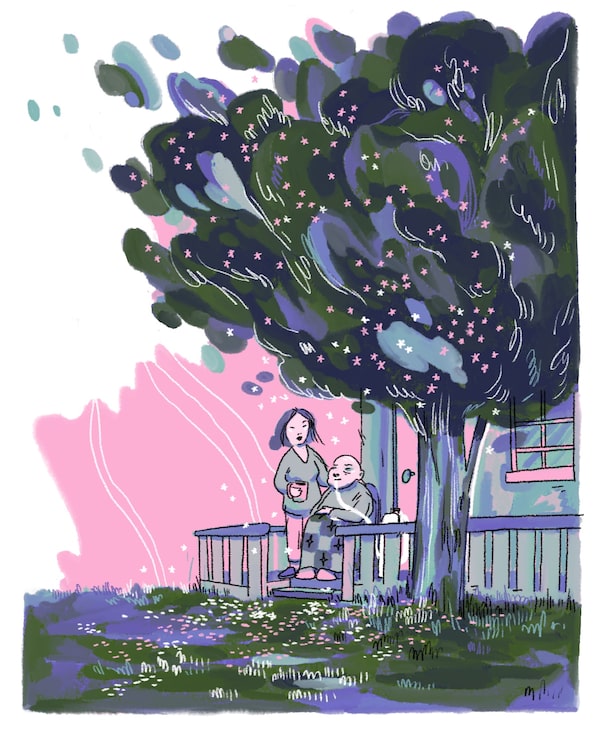First Person is a daily personal piece submitted by readers. Have a story to tell? See our guidelines at tgam.ca/essayguide.

Illustration by April Dela Noche Milne
Dad’s final spring taught me a lot about living.
Dad planted the crab apple tree in the front yard in 1986, about a year after we moved into the new house. I was 12 years old. I remember him placing that scrawny tree deep into the earth and then gently securing the small sapling with rope. He watered it dutifully – and he worried about whether it would make it through that first winter. As the years passed its roots took hold, and it slowly expanded in girth and height, its branches extending across the lawn like an enormous umbrella. It endured the devastating ice storm of 1999 – and remains one of the only original trees on the street still standing. It survived disease and it withstood pests. That tree was a focal point for so many photos over the years – dad’s retirement, high school and university graduations, milestone birthdays, and eventually four grandsons who often posed with dad underneath the canopy of those sturdy branches.
A crab apple tree in spring is exquisitely beautiful. There is something so hopeful in the delicate and fleeting beauty of those fuchsia blossoms. As dad’s health began to decline over the winter months I wondered if he would see that crab apple tree in bloom again. Dad loved that tree. He enjoyed spending his days out on the front porch relaxing in the shade, listening to the birds singing and watching squirrels dart from branch to branch. It was a simple pleasure and one of the few things he was still able to enjoy. At 79, dad had struggled for several years with chronic kidney disease and dementia. He was exhausted as his kidney function deteriorated to just 7 per cent, yet he remained cheerful as he looked forward to the end of a long winter.
On the first day of spring dad suddenly took a turn for the worse. He was extremely short of breath and feverish. He was taken by ambulance to hospital and was diagnosed with a serious blood infection. The doctors didn’t think he would make it through the week. Dad surprised us and he pulled through. He was in good spirits despite his dire prognosis. His wide smile and easy laugh won him many friends on the ward. On May 2 after several weeks in hospital we decided to bring dad home with the support of an incredible palliative care team. We set him up with a hospital bed downstairs, and the house buzzed with health care workers and visitors. I moved back into my childhood home to help mom with his care.
Caring for a loved one at home at the end of life is not like it is portrayed in the movies. It isn’t romantic. It is hard. It is exhausting. The learning curve for caregivers is steep. There are so many difficult choices and challenges. It is often a roller coaster of emotions. But the stress is also punctuated by simple moments of intense, simple beauty. Like when I wrapped dad in a soft blanket, and he turned to me and whispered: “Nice and cozy. So nice and cozy. Thank you.”
Spring was late coming this year. When dad returned home, he brought with him a warm spell. The heat infused the grass and tree buds with life. Almost overnight the leaves sprouted, and glimmers of delicate pink blossoms appeared on the crab apple tree, waiting for just the right time to explode with colour and fragrance.
Just as the first blossoms began to appear, dad’s doctor told us he was “progressing.” It is an intriguing way to describe dying and I found comfort in it as I unpacked its meaning. Progressing, not regressing. Moving forward. Continuing. Evolving. As the blossoms revealed themselves, dad was slowly transitioning from this life. There is a natural unrelenting rhythm that governs all living things. Just as we cannot hasten spring or make those crab apple blooms last; I knew we could not keep dad here on Earth with us forever. We had to let him go.
It’s the third week of May. The crab apple tree has peaked. It is stunning. I try to memorize what it feels like to stand under its cover inhaling the colour and scent and sounds. Dad’s medical chart has been updated. It says he is now “actively” dying. Like those fragile petals, dad’s grasp on this life is tenuous now. Over the next couple of days, the blossoms fall like a gentle rain, carpeting the porch and driveway. Its flowering season is ending.
Dad’s breathing changes and he no longer wakes. I pace. I listen. I watch. I wait. On the third Friday in May the lawn is pink with blossoms. It’s one of those perfect spring days. The sun is shining and there is just a hint of a breeze. It’s the kind of day that beckons you outside and fills your soul with gratitude for the end of a long winter. It will be dad’s final day. I can sense he is leaving, and I miss him already. He lived long enough for the crab apple tree to reveal its splendour, but he was too sick to see it. Yet, I trust that he will see beauty and grace far beyond anything I could ever imagine.
Dad takes his final, peaceful breath in the wee hours that night. He is surrounded by love. It’s 3:30 a.m. but I can already hear the birds stirring and beginning to sing, anticipating the light and the dawn of a new day.
Jennifer Schenkel lives in Navan, Ont.
Sign up for the weekly Parenting & Relationships newsletter for news and advice to help you be a better parent, partner, friend, family member or colleague.